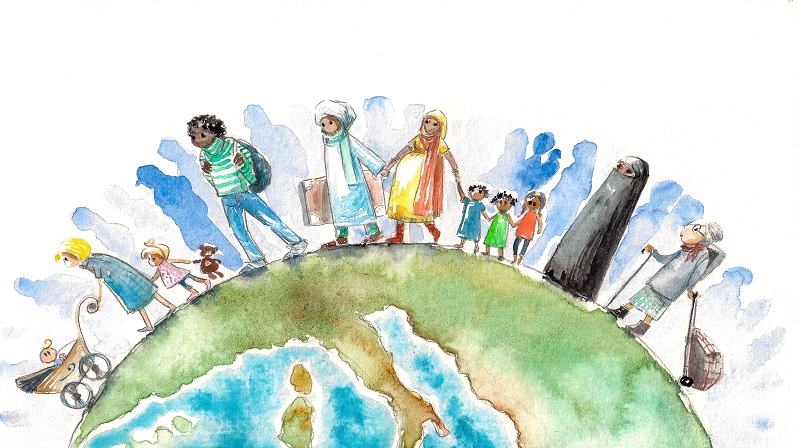Migrant Children Are Suffering – Here Is How You Can Help

Dear friends,
If you have images looping in your mind of children, cold and sitting on concrete floors, sick and begging for their parents, you are not alone.
Like most of you, I am horrified and outraged by the reports of migrant children being held in crowded and unsanitary jails. The newsletter is intended to give you some background into why this is happening and what you can do to help.
For the last ten years, gang violence in the northern triangle of Central America has increased. Children are the most vulnerable to gang violence. Young boys are expected to join the gangs around the time they reach puberty, and girls are chosen as the sexual property of gang members. If anyone in the family refuses advances by the gangs, they will be murdered. Gang members act with impunity and in many cases, have infiltrated police departments. The families we see coming from Central America are faced with an impossible choice: stay and be raped, tortured, or murdered, or make the increasingly treacherous journey to safety in the United States, the only nearby country where gangs and cartels are not in control.
Faced with a slow rise in Central American migrants, the Trump Administration has taken various steps that have led us to the current crisis of chaos. Here is a chronological snapshot of actions taken by the Trump administration since early 2018:
- “Metering” or “turnbacks” – Border patrol rejects asylum seekers who come to the ports of entry asking for protection, leaving them with two choices: remain in Mexico without shelter, food, or water, or enter without inspection.
- Enacting Zero Tolerance – prosecuting all individuals who choose option 2 and enter without inspection.
- Family separations – using the zero tolerance prosecutions as an excuse for ripping children from their parents, then backpedaling on the policy after public outcry last summer. Many families remain separated from the haphazard way the policy was implemented without tracking.
- Continuing to separate migrant relatives who are not parents (aunts, uncles, siblings, grandparents, parents of children over 18), adding to the number of “unaccompanied” minors in DHS custody.
- Implementing hurdles to release of unaccompanied migrant children in DHS custody to a family member. For example, requiring a background check of anyone else living in the home where the child will be residing, and processing those who come forward for deportation proceedings, creating a very chilling effect on family sponsorship applications.
- Rather than focusing resources on the efficient and humane processing of migrant children and families, the administration revokes humanitarian resources (like legal representation, soccer, and English lessons) and holds migrant children in border patrol processing facilities, now notorious for their awful conditions thanks to federal litigation providing oversight to the facilities by Plaintiff’s counsel in the Flores case.
- Seven children have died in DHS custody since last year compared to zero in the previous ten years.
The current situation is this: there are thousands of migrant children who need to be processed and released. Many of you are horrified and want to help, but don’t know where to start. This newsletter will give you some ideas.
There are many deserving organizations who are providing on-the-ground assistance in the form of legal representation, shelter and donations to released migrants. Connecting with those organizations to donate or do volunteer work is ideal.
This list is a great starting point.
What I do not recommend: offering to foster migrant kids or donate to the detention centers. Almost 100% of these children have a family member in the US who can sponsor them, and they should not be released to strangers over their own family members. Donating to detention centers is not advisable for two reasons: most detention centers are either managed by for-profit private prison companies or paid for by the U.S. Government. The issue is not a lack of resources. It is a lack of concern for the welfare of migrants.
Here are some good ways to spend your time and resources:
- Casa Marianella is a homeless shelter for migrants located in Austin. They are housing and supporting migrant children and families and they need HEB (a Texas grocery store chain) gift cards to help feed their residents. Please direct your donations to kpoor@casamarianella.org (Donation Emails ONLY).
- RAICES is a Texas immigration legal services nonprofit whose positive impact on the migrant population cannot be summarized in one paragraph. Among many other things, the organization is providing legal services for released families. To volunteer: https://www.raicestexas.org/volunteer/
- Seriously – call your lawmakers and demand a change. I know we get sick of seeing this in the “what you can do” articles, but it’s true! Your calls and emails make an impact.
- Finally, (and this is always true) if you can’t donate money, don’t have the skills for a specific volunteer project, can’t travel to the border, but need to do something: focus on the upcoming election and what you can do locally to get out the vote and change the policies and people who allow these atrocities. You can never go wrong with getting out the vote.
In solidarity,
Kate
C A L L and V O T E!
We need all our immigrant allies to rally for the 2020 elections and VOTE for representatives that won’t impose cruel immigration policies on suffering migrants.
Call your representatives and demand that detained migrants kids are processed to their U.S. sponsors without delay.
Find Your Rep here.
Share this story!
Contact a U.S. Immigration Attorney Today!
Categories
How To Find Us
What Our Clients Say
“This Lawfirm is great, very professional and helpful. I love that they are always in communication and always available for when you have questions . 100% recommended by me and my family. Thank you Lincoln-Goldfinch Law – Abogados de Inmigración”





